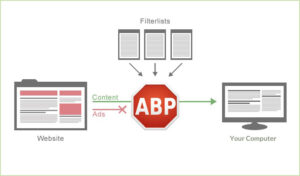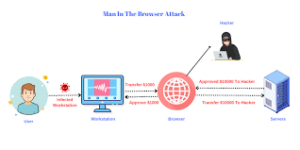Secure web browsing is essential in an era of increasingly sophisticated cyber threats. As users navigate the Internet, their interactions with web browsers can expose them to various risks, including malware, phishing attacks, and data breaches.
Web browsers serve as gateways to the digital world, displaying websites filled with images and text while running complex code and animations.  Unfortunately, these powerful capabilities can also be exploited by malicious actors looking to penetrate a user’s system.
Unfortunately, these powerful capabilities can also be exploited by malicious actors looking to penetrate a user’s system.
Leading web browsers like Microsoft Edge, Mozilla Firefox, Apple Safari, and Google Chrome often have insecure default settings. Users may unknowingly compromise their safety if they don’t take the initiative to configure these settings appropriately.
Standard features such as pop-up blockers, password managers, and tracking protection enhance security but require users to be proactive. To fully leverage these tools and minimise risk during online activities, users must educate themselves on privacy practices and web browser configurations. Ultimately, informed browsing leads to a significantly safer online experience.
Extensions are specialised software programs designed to enhance and personalise your web browsing experience. Created with website coding languages such as HTML, CSS, and JavaScript, these extensions allow users to tailor their interaction with the internet to suit their specific needs.
They come in many forms and fulfil various functions. Some popular examples include ad blockers that prevent intrusive advertisements from cluttering your screen and tools that facilitate seamless video conferencing right within your browser.

Alongside extensions, cookies play a crucial role in how we navigate the online world. These small text files are placed on your device by websites you visit to store essential data. They help websites remember details such as user preferences or login information, acting like digital memory for each site.
However, not all cookies serve benign purposes. Some malicious software can masquerade as cookies or take advantage of cookie-tracking features to compromise your privacy and security. This duality highlights the importance of understanding both extensions and cookies as vital components of modern web interactions—tools that enhance our experience while also posing potential risks if not managed carefully.

Browser caches serve as temporary storage areas within a computer’s memory or hard drive. This space is designed to hold portions of web pages, such as images, scripts, and HTML files. When you revisit a website, your browser can quickly pull this information from the cache rather than downloading it anew. This speeds up loading times and improves your overall browsing experience.
On the other hand, private browsing is a feature that many modern web browsers provide for users seeking enhanced privacy. When activated, it prevents the browser from saving your browsing history, cookies, and site data after your session ends. This means that once you close the window, all evidence of your activity vanishes.
Some versions of private browsing go even further by implementing tracking protection measures. They may disguise your location or block specific online trackers from monitoring your activities. However, while private browsing offers some level of anonymity, it does not guarantee complete privacy or security.

Your internet service provider could still track your online behaviour, and websites may still collect data on you during these sessions. Ultimately, understanding both browser cache and private browsing can help you make informed choices about how to navigate the vast landscape of the internet while managing your digital footprint.
In the realm of cybersecurity, password managers have become a staple feature in most contemporary web browsers. These tools are designed to store your login credentials for numerous websites, providing convenience at your fingertips.
However, relying on built-in password managers rather than opting for dedicated third-party solutions is often discouraged from a security standpoint. This caution arises because not all integrated password managers are engineered with robust security measures to safeguard sensitive information effectively.

Moreover, the functionality of automatic downloads enhances user experience by streamlining the process of obtaining files on one’s device. Yet, this convenience carries inherent risks; it can also serve as a gateway for malicious entities to swiftly compromise a system.
While these features aim to enrich browsing experiences, they simultaneously present vulnerabilities that could be exploited by cybercriminals if adequate protections are not in place or if existing weaknesses still need to be addressed.
The significance of securing your browser cannot be overstated; neglecting this responsibility could lead to dire consequences such as unauthorised access to personal data, encryption or deletion of essential files, or even using the compromised computer as a launching pad for attacks on other networks.

Various threats loom large in this digital landscape: vulnerabilities within web browsers can permit malicious websites to introduce malware or spyware into the system; they can enable the misuse of features like cookies that track user activity and undermine system integrity; they can facilitate theft of sensitive information transmitted through online platforms—ranging from banking details to confidential voter data—and they can expose private information stored within the browser’s cache.
Additionally, browser extensions and toolbars pose their own set of dangers, mainly when sourced from dubious providers. Neglecting regular updates for these add-ons or failing to remove those that have fallen out of support creates opportunities for cybercriminals similar to those presented by outdated software lurking elsewhere on a system.
It’s worth noting that many extensions do not automatically refresh when browsers themselves receive updates; often, these programs are managed by individuals who lack consistent maintenance protocols.

In conclusion, it is imperative to remain vigilant against potential exploits targeting these vulnerabilities. Cyber adversaries actively seek out weaknesses in an effort to gain unauthorised access and manipulate users’ sensitive information—making it essential for individuals and organisations alike to prioritise robust cybersecurity practices and ensure their digital environments remain fortified against such threats.
In the realm of election security, officials must take proactive measures by conducting a thorough audit of their technological systems. This involves not only identifying the various software applications currently in use but also understanding the intricate ways in which these programs interact with one another. Furthermore, it is crucial to establish robust browsing protocols that clearly define which features should be restricted to enhance overall security.
To effectively implement these measures, election officials must collaborate closely with their IT departments. Together, they should develop and enforce technical policies that ensure secure configurations across all systems. For instance, turning off automatic downloads can serve as a critical first step in safeguarding against potential threats. Additionally, requiring users to acknowledge a pop-up prompt before any download occurs adds another layer of protection.

Another important aspect is managing browser extensions. Election officials should either limit or diligently track which extensions are permitted to run within their web browsers, ensuring that these tools originate solely from reputable sources. In this context, exploring the deployment of virtual machines (VMs) or sandboxes can provide a secure environment for web browsing while simultaneously minimising the risk of compromising the entire system.
Notably, many popular web browsers offer sandboxing features—designated areas isolated from the central operating system—where users can safely navigate online without exposing their broader system to potential vulnerabilities. Furthermore, encouraging employees to use Virtual Private Networks (VPNs) enhances both privacy and encryption during internet usage.
Establishing a comprehensive patch management program is essential to mitigate further risks associated with cyber exploits. This approach not only helps keep software up-to-date but also reduces opportunities for malicious attacks by adhering to the principle of least privilege, which limits access rights for users and applications based on necessity alone.
Finally, it’s vital to educate users about the dangers posed by misleading redirects or deceptive links they may encounter online. Often designed to appear legitimate at first glance, such links can lead unsuspecting individuals astray—redirecting them toward entirely different website with more documents than intended. By fostering an environment in which vigilance and caution are prioritised among all personnel involved in elections, we can bolster our defences against potential cyber threats and ensure a more secure electoral process overall.
Maxthon
In the current era dominated by digital interactions, it has become increasingly vital to protect your online banking details, mainly when using a browser like Maxthon. To help you navigate this complex environment with confidence, let’s explore some fundamental strategies that can significantly improve your security.

The robustness of your passwords is at the core of your online safety. It’s essential to create passwords that are not unique but also intricate. Strive for a combination of uppercase and lowercase letters, numbers, and special characters to form a strong password. Avoid using easily identifiable information such as birthdays or pet names; these types of details can be too straightforward for cybercriminals to guess.
Another critical step in fortifying your security is enabling Two-Factor Authentication (2FA), provided that your bank offers this feature. By turning on 2FA, you add an extra layer of defence that requires you to enter a code sent via text message or email in addition to your password. This additional verification step can significantly reduce the risk of unauthorised access.
Keeping your Maxthon browser up-to-date is equally important. Regularly checking for updates allows you to take advantage of the latest security patches and improvements designed to guard against new vulnerabilities. Staying informed and current with these updates may be one of the easiest yet most effective methods for enhancing your overall protection.
Additionally, make it a routine practice to clear out your browsing data on a frequent basis. By deleting your browsing history, cache, and cookies regularly, you remove any stored sensitive information that hackers could potentially exploit if they were able to access your device. Maxthon also features a privacy mode option, which can provide further protection during online banking activities. When activated, this mode ensures that no data—such as cookies or site information—is saved after each session concludes, thereby offering an extra layer of anonymity while handling financial transactions online.
To further bolster your defences against potential threats, consider installing reputable security extensions or tools explicitly designed to enhance browser safety and privacy during online banking sessions. These additional measures can contribute significantly to creating a more secure digital environment as you manage sensitive financial information through Maxthon.
